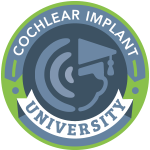Supporting Your Student
The transition to college may be stressful for you and your student with cochlear implants, but there are several things you can do to reduce stress and prepare your student for college. In high school, the best thing you can do is ensure your student develops his or her self-advocacy skills because, in college, you won’t have a legal right to advocate for your student. In college, your student is responsible for ensuring he or she receives necessary accommodations.
Visit the Resources section for a timeline checklist to help guide you as you support your student as he or she transitions to college.
High school is the perfect time to give more responsibility to your student for his or her accommodations. This will help prepare your student for college where he or she will be responsible for ensuring he or she receives the necessary academic and residence life accommodations.
If your student had an IEP or Section 504 plan, he or she should begin attending meetings and, as time passes, provide more input about his or her goals and the necessary accommodations to achieve them. Visit the College Preparation section for more ideas about tasks your child should complete and use this information to encourage your student to increase his or her responsibility and independence. You can also visit the Accommodations section to review common accommodations and how your student can request them in college.
As your student begins choosing colleges, visiting colleges, and applying for financial aid, you can encourage him or her to become more independent by using the guidance and resources provided in the College Planning section.
In college, your student is responsible for his or her own accommodations, including the process of requesting and ensuring he or she receives them. This is often a foreign role to parents and it can be a difficult transition.
For example, Ellen has a son who has a unilateral cochlear implant and a hearing aid. She was very involved in helping her son find a college that was right for him and working with the Office of Disability Services to provide documentation for accommodations. Ellen described the change in her role with her son as a “light switch” – one day she was able to work with the school and then next it was all up to her son.
Despite your changing role, you can still encourage your student to use his or her self-advocacy skills, especially if he or she experiences accommodation challenges, and you can make sure he or she is prepared for orientation and has a cochlear implant maintenance plan. Your student may rely heavily on you when issues arise with his or her cochlear implants and may still turn to you while he or she is at college, but you can equip them to handle most issues with preparation.

